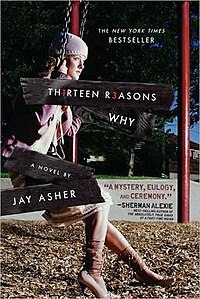
Switched is about a girl, Wendy, whose mother tried to kill her on her sixth birthday because she believed Wendy was not really her child. Eleven years later, with her mother in a mental hospital and under the care of her older brother and aunt, Wendy finds out she was right.
Wendy is a troll, and I think her reaction to finding out is pretty priceless: "Nothing about me resembled a pink-haired doll with a crystal in its stomach or a creepy little monster that lived under a bridge. Admittedly, I was kind of short, but Finn was at least six feet tall." She is taken to the Trylle kingdom, where she discovers she is actually next in line for the throne, and she is none too happy about it. She spends the rest of the three books trying to find her way in her new life (and often fighting to get out of it entirely!).
I have to say, this trilogy got better and better the further I read. Wendy, the heroine, gets stronger and more independent. The obvious choice is rarely the one that writer, Amanda Hocking, makes, which is delightful in any fiction, but especially in girls' YA fiction. She doesn't spend the books mooning over the same boy, and very often pushes love out of her mind for the betterment of the Trylle kingdom and her own independence.
I hesitate to give details because I don't want to ruin the wonderful surprises for future readers, but this whole trilogy was a 5 star absolute must-read! That's as much as I'm giving away. It falls somewhere on the drama-o-meter beneath The Twilight Saga, and I can't quite think of a book to go below it at the moment. It's a lot of fun, drama, and romance, and it was good enough for me to immediately buy the second book and third books in the trilogy after I read the first.
5 Stars
This book has now become part of my foundation and is an extension of the very essence of me...I laughed, I cried [or some other emotion] and am sad this reading is over...gush, gush, gush...
Teacher Advisories **CAUTION: MAY CONTAIN SPOILERS!**
Sex 2/5
There is some kissing/making out between Wendy and a male lead, but nothing too detailed or heavy. Sex is alluded to on a few occasions, but it's actually because Wendy gets married to a guy she doesn't love/isn't attracted to and wants to avoid it.
Language 1/5
There may have been a word or two, but nothing I remembered.
Substance Abuses 0/5
Nothing at all!
Violence 3/5
There's some violence, mostly in the third book as a war rages between two kingdoms of trolls. It may be great in volume in a couple of spots, but it's mostly magic based, and it's not really graphic. I've seen worse than what was described on tv!
Touchy Subjects
Family
Wendy's relationship with her mother is rocky because her mother has never believed Wendy was her child. Wendy's supposed brother loves her very much but has a lot of trouble accepting her new place in the world.
Wendy's relationship with her mother is rocky because her mother has never believed Wendy was her child. Wendy's supposed brother loves her very much but has a lot of trouble accepting her new place in the world.
Inter-class Relationships
Wendy is in love with a troll who is low on the social totem pole compared to her royal status. She and her troll mother get into it on more than one occasion over this matter.
Wendy is in love with a troll who is low on the social totem pole compared to her royal status. She and her troll mother get into it on more than one occasion over this matter.
Arranged Marriages
Wendy is the victim of an arranged marriage (though she eventually gets out of it). It's not really "touchy" in the traditional sense, but kids might have questions about whether this ever happens in the real world.
How this book is used in the classroom
1] Independent Read option






